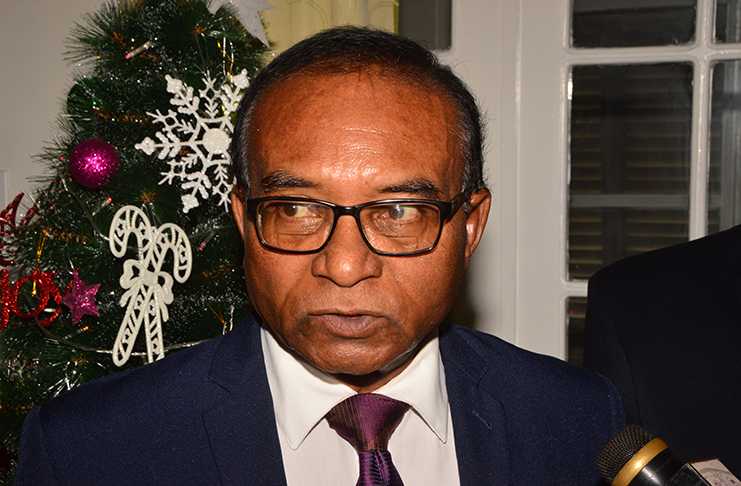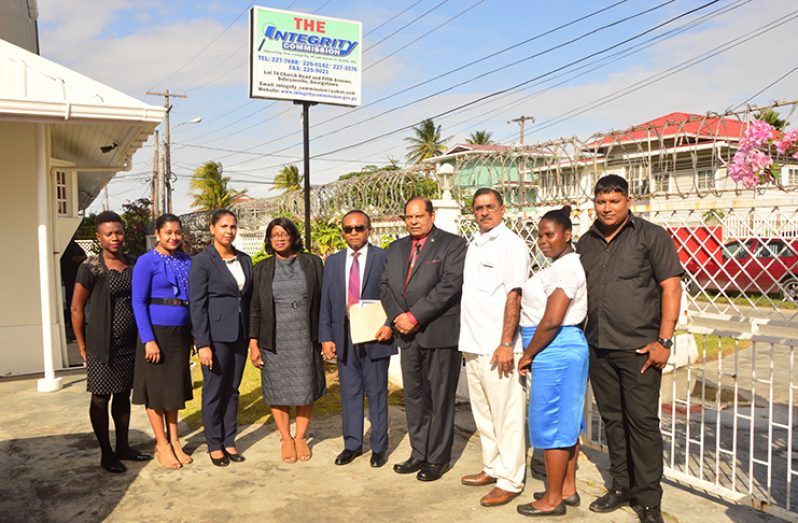– Integrity Commission to take legal action against defiant public officials
PUBLIC officials who fail to declare their assets and liabilities to the Integrity Commission in accordance with the Integrity Commission Act could see legal action being taken against them.
According to the Integrity Commission Act, Part III – Financial Disclosure, Section 13, a person in public life, not being a member of the commission, is required to file a declaration with the commission.
The Integrity Commission, according to its Chairman Kumar Doraisami, issued 1,400 declaration forms to the country’s public office holders, but to date only 430 declarations have been made.
Last November, the commission was forced to publish the names of 87 persons in public life who had failed to declare their assets and liabilities as of November 1, 2018. The batch included 41 Members of Parliament.
On the sideline of a tour of the commission’s Subryanville office by Prime Minister Moses Nagamootoo on Wednesday, Doraisami told reporters that while the commission is moving to boost its staff complement to 13 by January, 2019 to include at least five investigators, the failure of public officials to disclose their assets and liabilities remain a major stumbling block.
“The only problem we have is declarants actually not submitting their declarations,” he said, while explaining that the decision to publish the names of 87 defaulters had spurred some action, but not enough.
Section 19 of the Act states: “Where a person who is required to do so fails to file a declaration in accordance with this Act or to furnish particulars under section 18, the commission or the President, as the case may be, shall publish the fact in the Gazette and in a daily newspaper.”
Doraisami said “it is not too late,” for declarations to be made, as he urged persons in public life to step up to the task. “If public officers want the commission to secure their integrity, they must submit their declaration to the commission,” he urged in the presence of Prime Minister Nagamootoo.
Prior to the publishing of the list in the local newspapers in November, approximately 300 declarations were made. The number has now moved to 430; however, more than 60 per cent of forms remain outstanding.
Doraisami warned that the next step would be legal recourse, as he slammed Members of Parliament who have thus far failed to lead by example.
“People are getting to understand now that they must follow the law; most of the people who actually made the law haven’t complied with the law, so we had to take the step of publication, and we are looking that if they don’t fully comply within the next two months, we will have to take steps to prosecute them, they must comply with the law,” the chairman stated.
The Integrity Commission’s Office was relocated to Subryanville last September to cater for an expanding staff, including Doraisami and his supporting Commissioners Rosemary Benjamin-Noble and Rabindranauth Persaud. They were sworn into office in February 2018, and are assisted by Secretary Amanda Jaisingh.
FILE IT
Prime Minister Nagamootoo, who had no difficulties declaring his assets and liabilities before the commission having done so before the publication was made, said he has encouraged government Members of Parliament to file their declarations with the Integrity Commission.
However, he said that the process was “new” and public office holders have not gotten accustomed to the system.
“This Integrity Commission was set up under a law that was brought into existence in 2001; and for nine years, though a commission was established, the commission did not function,” the prime minister explained.
He recalled that it was only in June 2017, the Integrity Commission (Amendment of the Code of Conduct) Order 2017 was gazette by him.
In keeping with the 10 Principles of Public Life – accountability, dignity, diligence, duty, honour, integrity, loyalty, objectivity, responsibility and transparency – the order addressed issues of bribes, discrimination, gifts, conflict of interest, use of official influence, handling of classified information, use of public property, sexual misconduct and entertainment.
The expansion of the existing Code of Conduct brought the Act in line with the legislation governing the State Assets Recovery Agency (SARA) and the Financial Intelligence Unit (FIU), which states that employees of these state agencies must declare their assets in accordance with the Schedule II of the State Asset Recovery Act.

“We are hoping that members of the public who hold these offices are going to read these principles and know how important it is for us to re-establish integrity in public life. I know public life has taken a beating in Guyana, but there is no need for us to go back to the past and we need to move forward,” Prime Minister Nagamootoo said.
However, he admitted that persons may be afraid to disclose their assets over fear of prosecution. “People may not want to declare their assets because they are afraid that they may be investigated, that they may have to establish how they got their wealth, how they got their assets, they may be subjected to scrutiny to look at their earnings as against their holdings, and so people might be cautious that they may be accused of unjust enrichment,” he reasoned.
Notwithstanding that, the prime minister said at this stage that there may be need for the Act to be amended to add investigative and prosecutorial arms to the commission to give greater effect to its work.
Public officers and positions listed under Schedule 1 of the Commission’s Act are required to disclose their financial assets and liabilities on or before June 30 each year. When a public officer ceases to be a person in public life, he or she should disclose his or her assets and liabilities to the commission within 30 days from the date that individual ceased to be a person in public life, the legislation states.
In the past, the functioning of the Integrity Commission had been a controversial issue, though the previous administration had sworn in members in 1999. Commission Chairman, Bishop Randolph George, resigned in 2006, and was only replaced in February, 2018 by Doraisami.



.jpg)








